Intake Manifold Replacement Upper
Removal Procedure
- Disconnect the battery negative cable from the battery.
- Remove the air cleaner outlet duct from the throttle body. Refer to Air Cleaner Outlet Duct Replacement in Engine Controls.
- Remove the crankcase vent tube from the throttle body.
- Remove the PCV valve from the valve rocker arm cover.
- Remove the EGR valve if necessary. Refer to Exhaust Gas Recirculation Valve Replacement in Engine Controls.
- Remove the EGR pipe from the upper intake manifold.
- Remove the ignition coil from the intake manifold. Refer to Ignition Coil and Ignition Coil Module Replacement in Engine Controls.
- Remove the EVAP canister solenoid valve. Refer to EVAP Vent Valve Replacement .
- Remove the throttle body from the upper intake manifold. Refer to Throttle Body Assembly Replacement .
- Remove the EVAP canister purge solenoid valve. Refer to Evaporative Emission Canister Purge Solenoid Valve Replacement .
- Remove the number 8 spark plug wire from the distributor. Refer to Spark Plug Wire Harness Replacement .
- Remove the upper intake manifold bolts.
- Remove the upper intake manifold and gaskets.
- Clean the excessive carbon deposit from the exhaust and the EGR valve passages. Refer to Intake Manifold Clean and Inspect (Upper) .
Caution: Before servicing any electrical component, the ignition and start switch must be in the OFF or LOCK position and all electrical loads must be OFF, unless instructed otherwise in these procedures. If a tool or equipment could easily come in contact with a live exposed electrical terminal, also disconnect the negative battery cable. Failure to follow these precautions may cause personal injury and/or damage to the vehicle or its components.
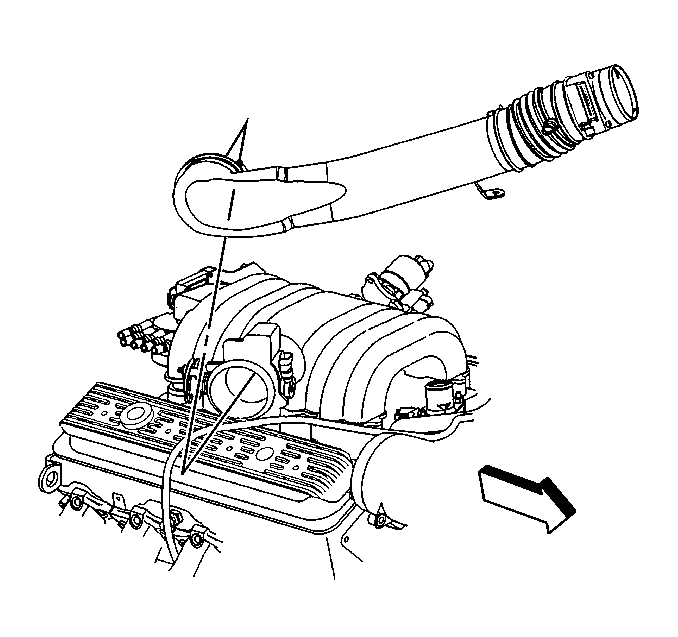
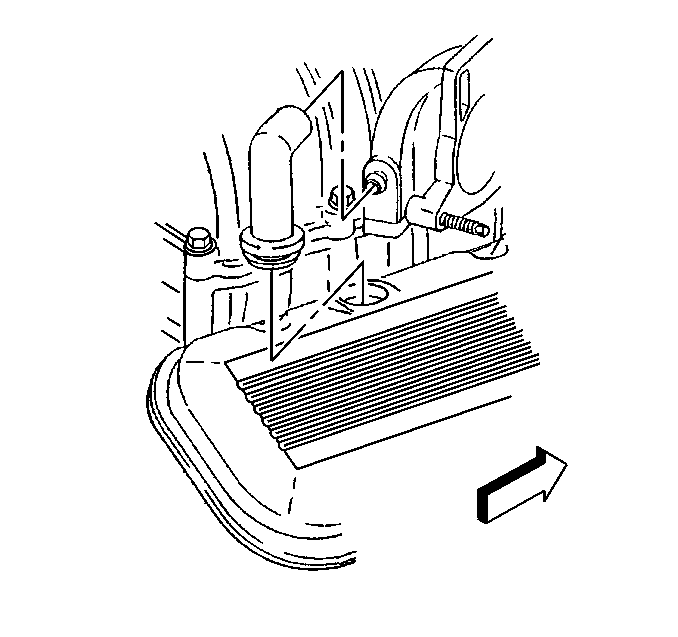
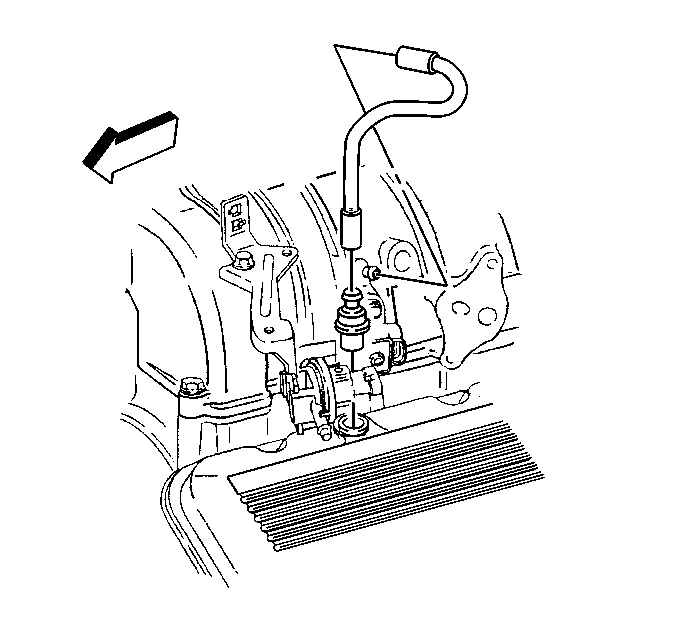
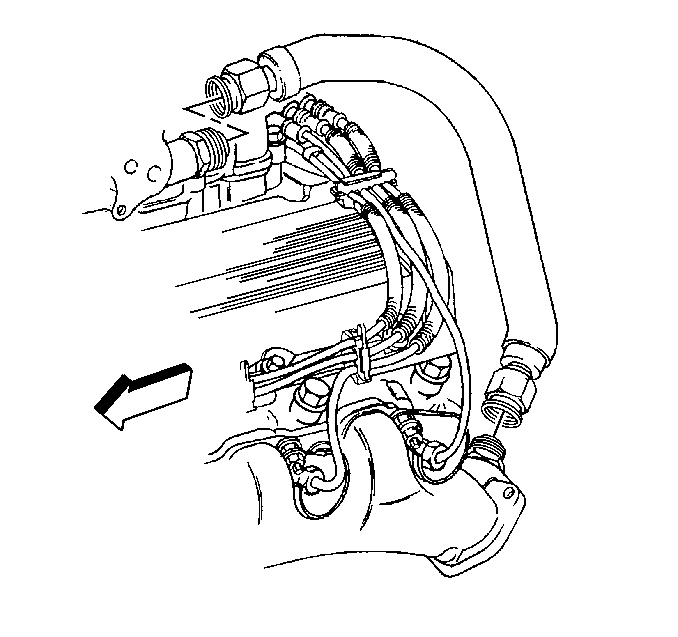
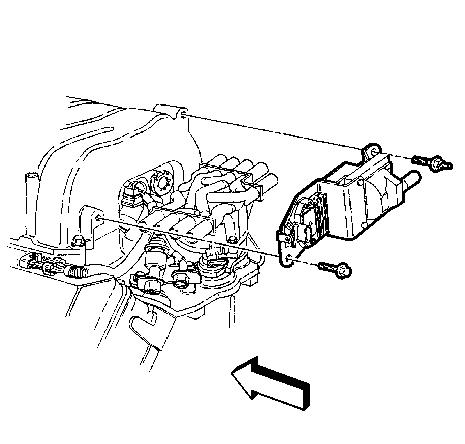
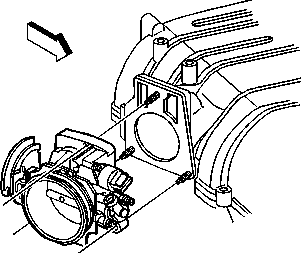
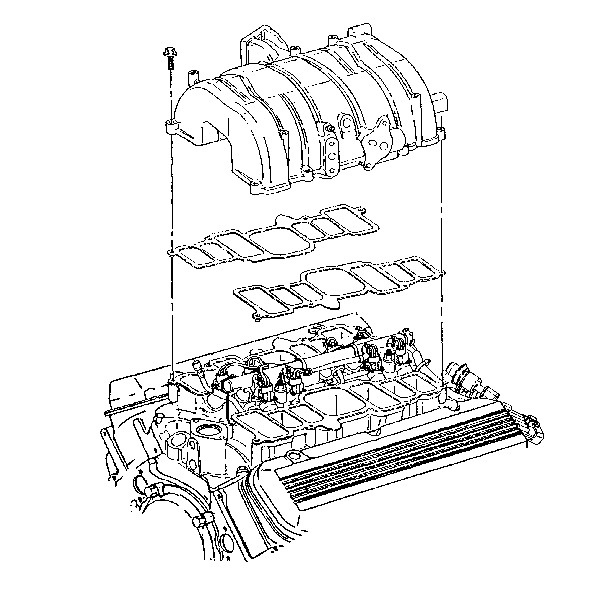
Installation Procedure
- Install the upper intake manifold gaskets.
- Install the upper intake manifold.
- Coat a minimum of eight threads of the bolts with thread locking sealant G/M P/N 12345493.
- Install the upper intake manifold bolts.
- Tighten the bolts in the following manner:
- Tighten the bolts in sequence to 8 N·m (72 lb in).
- Re tighten the bolts in sequence to 18 N·m (13 lb ft).
- Install the number 8 spark plug wire. Refer to Spark Plug Wire Harness Replacement .
- Install the ignition coil to the upper intake manifold. Refer to Ignition Coil and Ignition Coil Module Replacement .
- Install the EGR valve if necessary. Refer to Exhaust Gas Recirculation Valve Replacement .
- Install the EGR pipe to the upper intake manifold.
- Install the EVAP canister solenoid valve to the intake manifold. Refer to Evaporative Emission Canister Purge Solenoid Valve Replacement in Engine Controls.
- Install the throttle body to the upper intake manifold. Refer to Throttle Body Assembly Replacement .
- Install the EVAP canister solenoid valve. Refer to EVAP Vent Valve Replacement .
- Install the PCV valve to the valve rocker arm cover to the cylinder head.
- Install the crankcase vent tube to the valve rocker arm cover.
- Install the air cleaner outlet duct to the throttle body. Refer to Air Cleaner Outlet Duct Replacement in Engine Controls.
- Connect the battery negative cables to the battery. Refer to Battery Cable Replacement .

Important: Failure to follow the procedure listed, could cause a driveability problem.
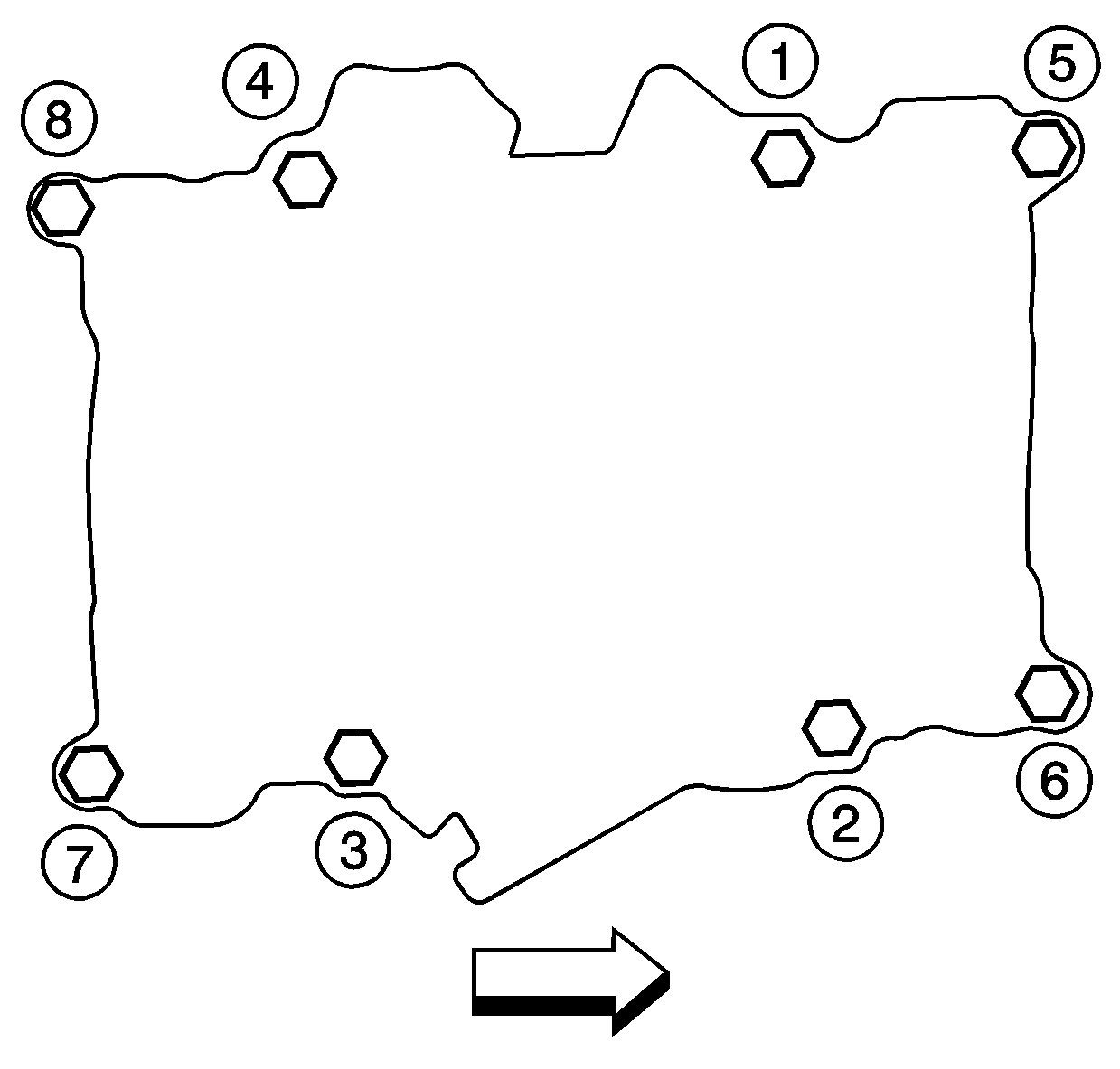
Notice: Use the correct fastener in the correct location. Replacement fasteners must be the correct part number for that application. Fasteners requiring replacement or fasteners requiring the use of thread locking compound or sealant are identified in the service procedure. Do not use paints, lubricants, or corrosion inhibitors on fasteners or fastener joint surfaces unless specified. These coatings affect fastener torque and joint clamping force and may damage the fastener. Use the correct tightening sequence and specifications when installing fasteners in order to avoid damage to parts and systems.
Tighten


Tighten
Tighten EGR valve pipe fittings to 60 N·m (46 lb ft).




Intake Manifold Replacement Lower
Removal Procedure
Important: The lower intake manifold gaskets and seals are reusable. Replace only the gaskets and seals if they are damaged.
- Drain the cooling system. Refer to Cooling System Draining and Filling in Engine Cooling.
- Disconnect the battery negative cable from the battery. Refer to Battery Cable Replacement in Engine Electrical.
- Remove the drive belt. Refer to Drive Belt Replacement .
- Remove the A/C compressor. Refer to Air Conditioning Compressor Replacement in HVAC.
- Remove the upper intake manifold from the lower intake manifold. Refer to Intake Manifold Replacement .
- Remove the distributor from the lower intake manifold. Refer to Distributor Replacement .
- Remove the MAP sensor from the lower intake manifold. Refer to Manifold Absolute Pressure Sensor Replacement .
- Remove the radiator hose from the thermostat housing. Refer to Radiator Hose Replacement .
- Remove the thermostat from the lower intake manifold from the engine block. Refer to Engine Coolant Thermostat Replacement .
- Disconnect the heater hoses from the intake manifold.
- Remove the coolant bypass hose from the lower intake manifold to the water pump. Refer to Water Pump Replacement in Engine Cooling.
- Remove the retaining bolts for the fuel rail. Refer to Fuel Injection Fuel Rail Assembly Replacement in Engine Controls.
- Remove the fuel rail from the lower intake manifold. Refer to Fuel Injection Fuel Rail Assembly Replacement in Engine Controls.
- Remove the lower intake manifold bolts.
- Remove the lower intake manifold.
- Remove the lower intake manifold gaskets and seals from the cylinder heads.
- Clean all sealing surfaces of oil and grease from the cylinder heads. Refer to Engine Block Cleaning and Inspection .
Caution: Before servicing any electrical component, the ignition and start switch must be in the OFF or LOCK position and all electrical loads must be OFF, unless instructed otherwise in these procedures. If a tool or equipment could easily come in contact with a live exposed electrical terminal, also disconnect the negative battery cable. Failure to follow these precautions may cause personal injury and/or damage to the vehicle or its components.

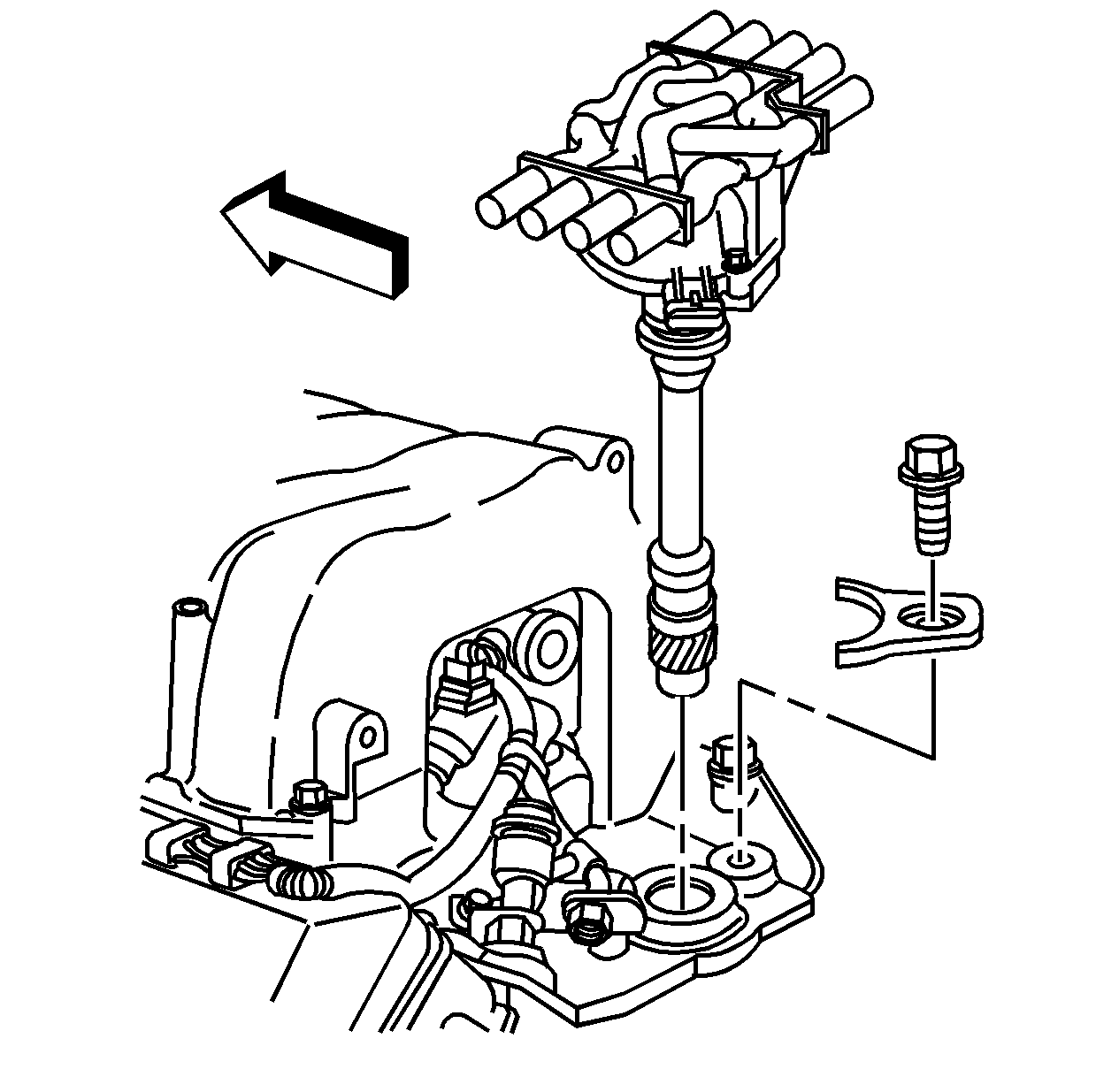
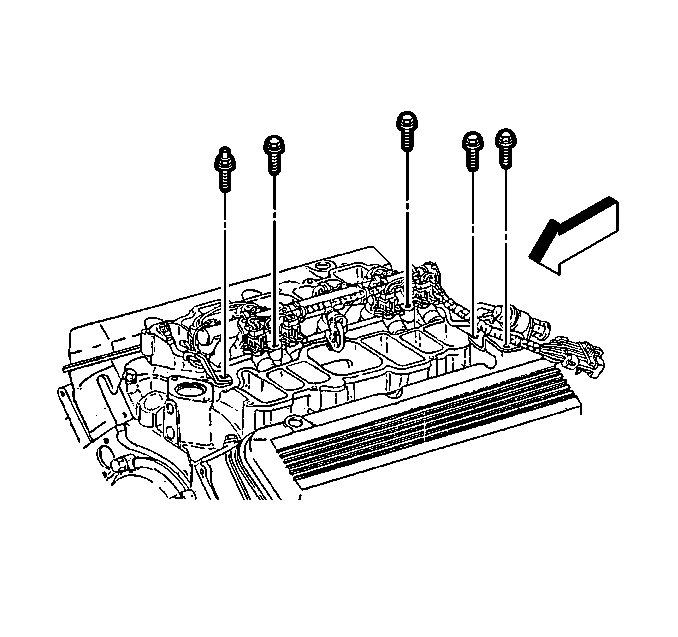
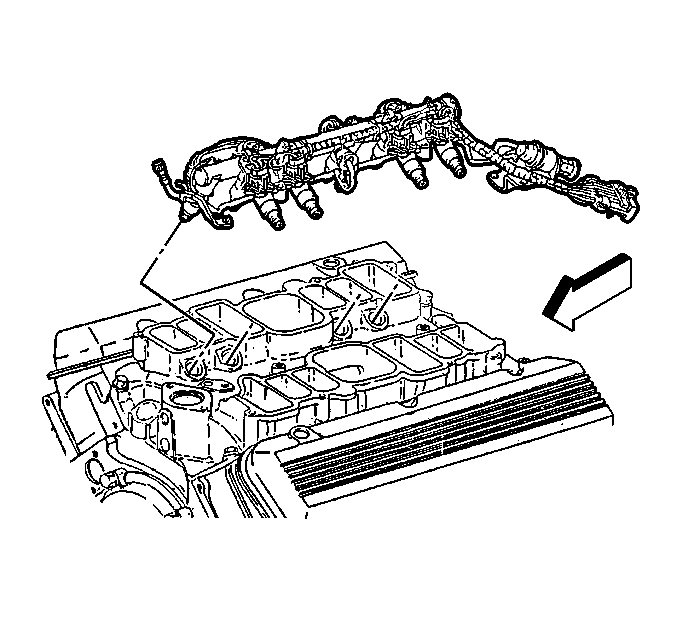
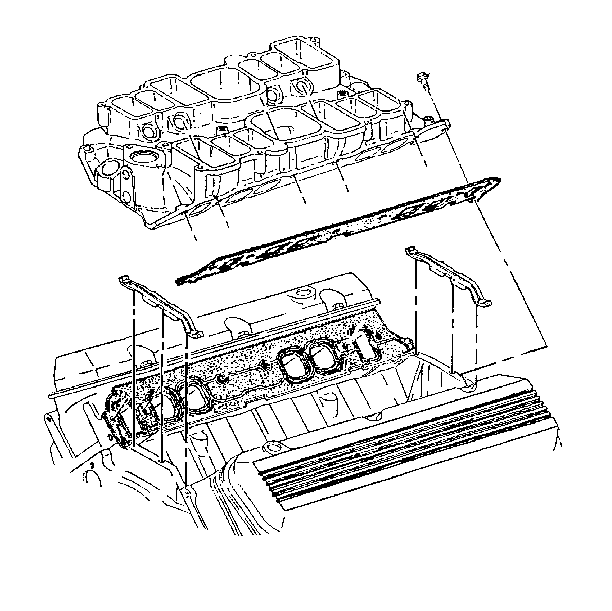
Installation Procedure
- Install the lower intake manifold gaskets to the cylinder head with THIS SIDE UP stamped facing up.
- Install the lower intake manifold.
- Apply the LOCTITE® 242 GM P/N 12345382 to the lower intake manifold bolts.
- Install the lower intake manifold bolts.
- Tighten the lower intake manifold bolts (1-12) a first pass in sequence to 30 N·m (22 lb ft).
- Tighten the the lower intake manifold bolts (1-12) a final pass in sequence to 40 N·m (30 lb ft).
- Install the MAP sensor to the lower intake manifold. Refer to Manifold Absolute Pressure Sensor Replacement in Engine Controls.
- Install the fuel rail to the lower intake manifold. Refer to Fuel Injection Fuel Rail Assembly Replacement in Engine Controls.
- Install the fuel rail retaining bolts. Refer to Manifold Absolute Pressure Sensor Replacement in Engine Controls.
- Install the thermostat to the lower intake manifold. Refer to Engine Coolant Thermostat Replacement .
- Install the coolant bypass hose to the water pump. Refer to Water Pump Replacement .
- Connect the heater hoses to the lower intake manifold.
- Install the radiator inlet hose to the lower intake manifold.
- Install the distributor to the engine block. Refer to Distributor Replacement .
- Install the upper intake manifold to the lower intake manifold. Refer to Intake Manifold Replacement .
- Install the A/C compressor. Refer to Air Conditioning Compressor Replacement in HVAC.
- Install the drive belt. Refer to Drive Belt Replacement .
- Refill the cooling system. Refer to Cooling System Draining and Filling .
- Connect the battery negative cable to the battery. Refer to Battery Cable Replacement .

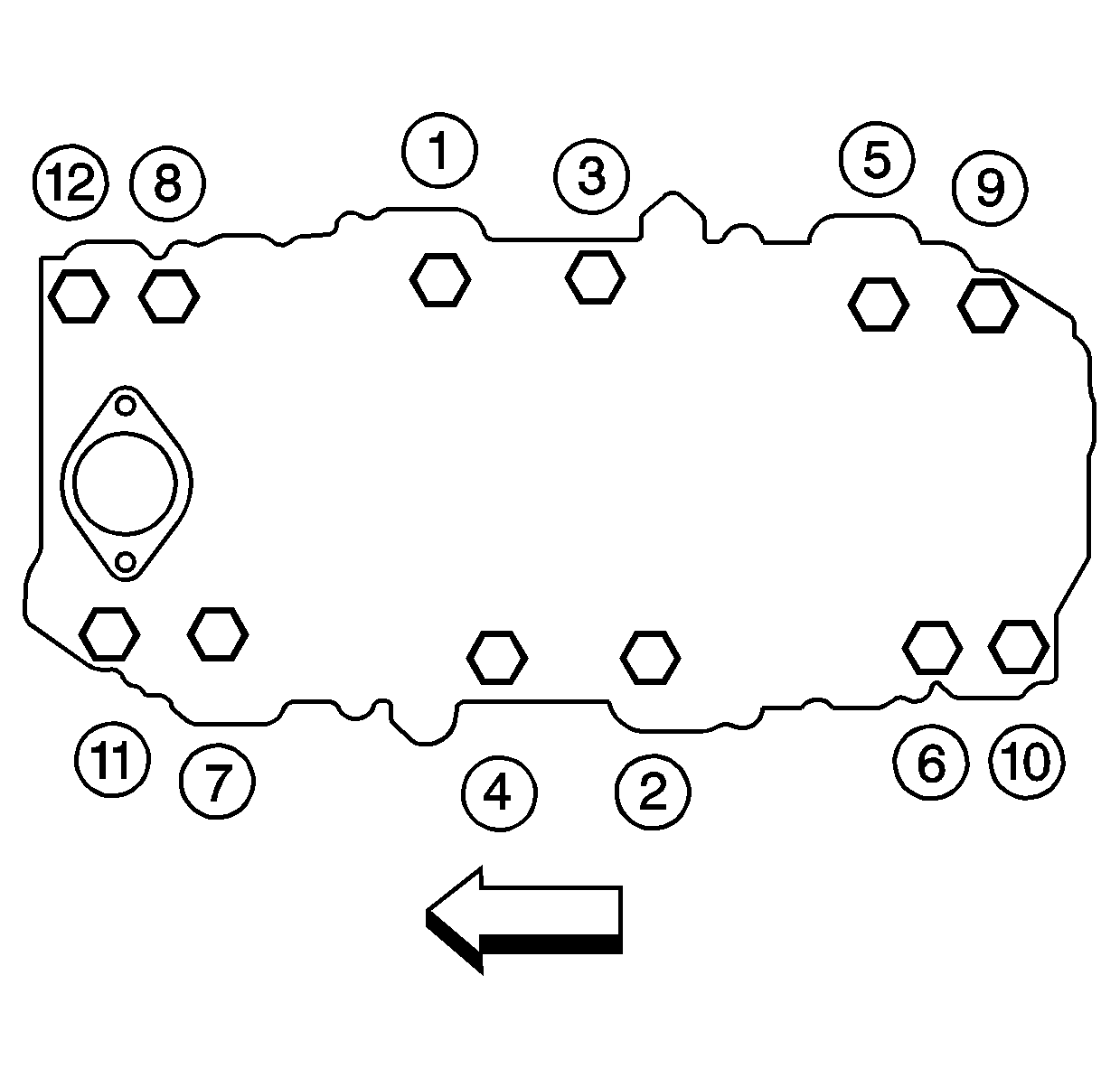
Notice: Use the correct fastener in the correct location. Replacement fasteners must be the correct part number for that application. Fasteners requiring replacement or fasteners requiring the use of thread locking compound or sealant are identified in the service procedure. Do not use paints, lubricants, or corrosion inhibitors on fasteners or fastener joint surfaces unless specified. These coatings affect fastener torque and joint clamping force and may damage the fastener. Use the correct tightening sequence and specifications when installing fasteners in order to avoid damage to parts and systems.
Tighten




